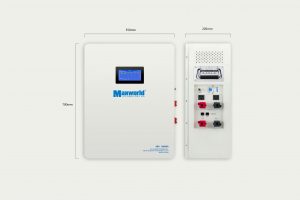What are Lithium Iron Phosphate Batteries' (LiFePO4) Advantages?
LiFePO4 batteries currently power the world of batteries. But what exactly does “LiFePO4” mean? What sets these batteries apart from other types?
Which battery types, whether you own a fishing boat, RV, solar home, or even if you use them for business purposes, are the best options and suitable for your specific needs? Modern electric motor and battery technology have made full electric propulsion systems for maritime applications more affordable than before. In this article, we will provide answers to all of these queries, go over the advantages of lithium iron phosphate batteries below, and demonstrate why they are the safest type of lithium battery and why they provide longer life and more power for electric boats.

Introduction
Making informed decisions about batteries is crucial for owners and operators as electric propulsion systems gain popularity. The performance of the boat and lifetime costs will be impacted by decisions made during the design or retrofit phase.
As more boat owners go to electric propulsion and larger boats carry more electric tenders and rechargeable water toys, the information that follows will help you better understand what to look for when picking your battery systems.
What is a LiFePO4 battery?
A type of lithium-ion battery known as a lithium iron phosphate battery makes use of lithium iron phosphate cathode materials. It is sometimes referred to as a LiFePO4 battery or an LFP battery (for lithium iron phosphate, the chemical acronym).
Now that we know the difference between lithium ion and lithium iron, let’s learn why LiFePO4 battery packs are the best choice for electric propulsion in recreational boats and small commercial vessels.
Why LiFePO4 Batteries Are Good
Compared to alternative lithium-ion battery architectures and vintage lead-acid (LA) batteries, LiFePO4 has a number of benefits. They are among the best value options for electric boat propulsion because they are lighter, require no maintenance, have better charge and discharge characteristics, and have a much longer life.
High current rating, longer cycle life, no risk of leaks or fires, and tolerance for less-than-ideal charging and discharging cycles are some additional key advantages of LiFePO4.
1. High Performance
Why do LiFePO4 batteries function so well? Lithium iron phosphate (LiFePO4) offers a superior combination of attributes when compared to systems that employ lithium-ion or lead acid batteries as an alternative, particularly for propulsion in recreational boats and small commercial vessels.
In comparison to LA chemistry and other lithium battery chemistry, LiFePO4 batteries have increased discharge and charge efficiency and the capacity to deep cycle while maintaining performance.
2. Better performance starting with the keel
Lithium iron phosphate batteries (LiFePO4) are the perfect starting point for electric leisure boats due to their long life, low weight, and slow self-discharge rates.
3. The lifespan of LiFePO4 is longer.
Owners of boats with gasoline- or diesel-powered propulsion systems do not anticipate having to replace their motors every two to three years. Therefore, it seems a little unfair to demand that owners of electric boats change their entire battery pack on a regular basis, as is likely the case for boats with lead acid installations.
If using LA batteries, the punitive maintenance schedule would make it exceedingly challenging to defend an electric propulsion option. Batteries made of lithium iron phosphate (LiFePO4), however, can currently outperform those powered by fossil fuels.
4. Speedier Charging procedure
LiFePO4 batteries charge more quickly than lead acid or other lithium batteries because they have four times the higher energy density and can be charged five times more quickly than lead acid batteries.
A LiFePO4 battery’s cycle life can be up to five times longer than that of some lithium-ion batteries, frequently exceeding 5000 cycles without noticeably losing performance.
LiFePO4 battery packs can be fully discharged without suffering any harm or performance loss.

5. LiFePO4 weighs little
Lithium iron phosphate (LiFePO4 or LFP) batteries have an approximately 50% larger useful electrical capacity than lead-acid batteries while weighing up to 70% less. In addition, LiFePO4 batteries weigh around half as much as lithium manganese oxide (LMO) batteries, which are lighter than some lithium-ion batteries.
Smaller battery packs, less wasted space, and lighter propulsion systems are all benefits of LiFePO4’s superior power-to-weight ratio, which also increases interior design options and improves boat performance and electrical efficiency.
6. Additional weight loss
Comparative lead acid battery installations require battery boxes and much more wiring for terminal connections when compared to LiFePO4 battery installations, which results in further weight savings.
7. Ecologically sound to produce
LiFePO4 batteries don’t include hazardous, heavy, or rare earth elements like cobalt, nickel, or lead, unlike lithium and lead acid batteries. Common substances like graphite, iron, and copper make up LiFePO4.
These materials are more readily available, less expensive to obtain, and require less energy to mine and process, making them a more environmentally friendly option for boat owners seeking environmentally friendly electric boat propulsion solutions.
8. Post-Use Environmentally Friendly
Lithium iron phosphate batteries therefore have a smaller environmental impact during production but also have a significantly longer operational life than conventional lithium batteries.
The phosphate salts used in LFP batteries are significantly less soluble than the metal oxides used in other lithium batteries. Therefore, even if the battery is improperly disposed of, LiFePO4 units are significantly less likely to release toxins into the environment. The same cannot be stated with LA batteries, whose structure can deteriorate over time and result in the release of toxic chemicals.
Unlike batteries with conventional chemistry, LiFePO4 battery packs are also easy to recycle once they have served their purpose.
9. More secure than equivalent LA batteries and lithium ion batteries
The thermal and chemical stability of LiFePO4 batteries is superior to that of lead acid or other lithium ion batteries. Additionally, unlike some lithium ion batteries, they do not undergo “thermal runaway.” LiFePO4 battery packs are known for being exceptionally stable and intrinsically secure as a result.
Additionally resistant to temperature extremes, water-insoluble, and inflammable is lithium iron phosphate.
If exposed to high temperatures or hazardous conditions, a LiFePO4 battery won’t catch fire or explode. People who frequently use deep-cycle LiFePO4 batteries in an RV and bass boat will find this information comforting.
10.Lithium ion batteries are less resistant to temperature changes.
Outside of their ideal operating temperature range, which is typically between 10°C and 55°C, some lithium ion batteries have trouble functioning.
Although LA batteries are more tolerant of temperature extremes and can typically operate in the range of -40°C to 120°C, their electrical performance is significantly reduced at both the low and high ends of this range.
11. Better performance in extreme heat and cold
Fortunately, LiFePO4 batteries can operate in a wide variety of temperatures without experiencing any performance degradation.
LiFePO4 batteries are an excellent choice for nearly all practical recreational boating and commercial boat applications because they typically operate at full capacity in temperatures between -20°C and 70°C.
12. Requires no upkeep
A lithium iron phosphate battery doesn’t need any maintenance to increase its lifespan, in contrast to a lead acid battery. Additionally, LiFePO4 batteries do not experience any memory effects from premature drain followed by recharging.

LiFePO4 battery for each application
Lithium Iron Phosphate is preferred for any electronics or machinery that requires longevity and safety but not a lot of energy density. Along with portability, safety, and energy density, people are typically looking for a more affordable alternative, which LiFePO4 batteries offer.
The traits and qualities we’ve covered so far have shown that lithium iron phosphate batteries are a good fit for a wide range of uses. Fishing boats, solar panels of any kind, RVs or camper vans, and commercial or residential use are a few examples of places where LiFePO4 batteries have been used.
These batteries are the finest choice for boats because of their quick charge times and long operating times. Clearly, these special batteries allow you to navigate more freely and spend more time on the water. When selecting a battery for their RVs, every camper looks for features like ease of maintenance, affordability, and lightweight. Finally, the majority of people are searching for the safest option, which is nothing better than a LiFePO4 battery, in any commercial, residential, or military application.
The ideal LiFePO4 battery
What type of LiFePO4 battery should I pick? For propulsion systems from 2kW to 200kW, Maxworld has everything you need for recreational boats and small commercial vessel applications.
Lithium battery solution is one of the top producers of lithium Iron Phosphate batteries and battery systems. They are lauded for the innovative LiFePO4 batteries and second-life battery systems they make using cutting-edge refurbishing techniques for their chemical stability, dependability, and environmental friendliness. These batteries are produced in a variety of sizes for use in commercial, industrial, off-grid, marine, and recreational vehicle applications.
Maxworld Batteries come with an included battery management system and remote monitoring system, which allows you to monitor your battery system from everywhere at any time.
Conclusion
In a nutshell, these are the advantages of lithium iron phosphate batteries:
Comparable upfront costs
Five times longer than the operational lifespan
Costs across the board can be cut by more than 60%.
Comparable lead acid battery weight is around one-third of this.
The weight of equivalent lithium ion batteries is approximately halved.
Superior durability, chemical resistance, and thermal stability
Fewer alterations to the environment during the course of their lives
Compared to other batteries, such as traditional lead-acid batteries, lithium-ion batteries, lithium-manganese oxide batteries, lithium-cobalt oxide batteries, and other lithium chemistry like lithium-ion polymer batteries (LiPo).











